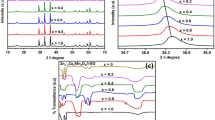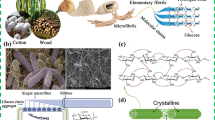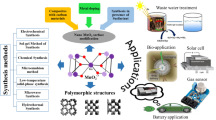Abstract.
Manganous hexacyanoferrate (MnHCF) supported on graphite powder was dispersed into methyltrimethoxysilane-derived gels to yield a conductive composite, which was used as electrode material to construct a renewable three-dimensional MnHCF-modifed electrode. MnHCF acts as a catalyst, graphite powder ensures conductivity by percolation, the silicate provides a rigid porous backbone, and the methyl groups endow hydrophobicity and thus limit the wetting section of the modified electrode. Cyclic voltammetry was exploited to investigate the dependence of electrochemical behavior on supporting electrolytes containing various cations. The chemically modified electrode can electrocatalytically oxidize L-cysteine, and exhibits a distinct advantage of polishing in the event of surface fouling, as well as simple preparation, good chemical and mechanical stability, and good repeatability of surface renewal.
Similar content being viewed by others
Author information
Authors and Affiliations
Additional information
Electronic Publication
Rights and permissions
About this article
Cite this article
Wang, P., Jing, X., Zhang, W. et al. Renewable manganous hexacyanoferrate-modified graphite organosilicate composite electrode and its electrocatalytic oxidation of L-cysteine. J Solid State Electrochem 5, 369–374 (2001). https://doi.org/10.1007/s100080000166
Received:
Accepted:
Issue Date:
DOI: https://doi.org/10.1007/s100080000166




